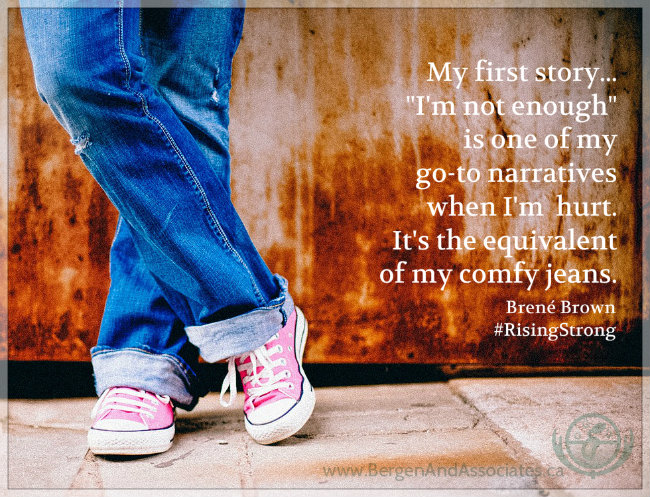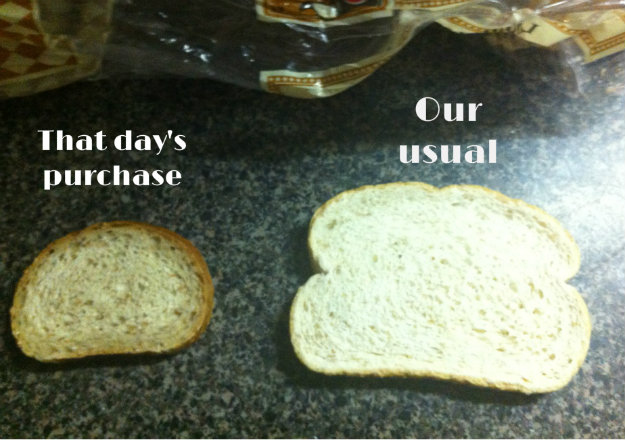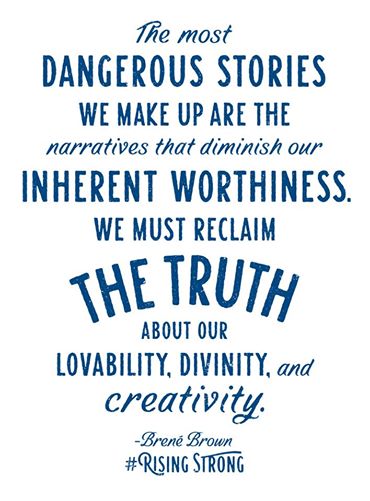
Picture this:
Four children are lying on the dock and happily playing looking at the minnows. They are chatting a bit back and forth, adding sound effects as the little fishies swim back and forth in the water. All of a sudden, one child looks up and notices something: “Hey guys, l like sand. Let’s go play in the sand” Two other children jump up with the first and go over to shore.
The fourth child, still watching the minnows, looks up and notices the other children get up to go play in the sand. There is a moment of uncertainty, maybe some confusion, and then this last child positively melts. Dissolves into tears.
This child, with fingers still wet from the water, runs down the dock to his mom in total despair. “Mommy–no one wants to play with me!!!”
OK…so…let’s slow this down and be mindful of the story…or rather, the layers of stories:
1. There was an outside story.
Four children watching minnows and playing in the water. One child says he wants to play in the sand. All but one child joins him.
That is what happened.
Simple, it would seem, eh?
2. There is an inside story
This is the story that Ia person tells him/herself about the story.
The child notices the other three children going to play elsewhere. The child feels abandoned and/or rejected by the other children. The child “knows” that the other children don’t want to play with him.
This story is one that we tell ourselves as we seek to make sense of the events. All the little boy has is his experience…where the other children are leaving the fun he is having with him.
3. The inside story and outside story are essentially fused and only seen as a single true story
4. The inside story is generally informed by shame
I’ve been reading Brené Brown’s new book, Rising Strong, which I received as an advance copy…a brilliant book about wrestling through the hard time with integrity to deal with “the stuff” we carry. (The book becomes available at the end of August–pre-order now!)
She says, amongst many other good things that:
A. We as humans love to make sense of things.
We are wired for story.
We need to make meaning of what is happening in our lives.
We will do what it takes to find and create meaning.
We are more concerned with meaning than with accuracy.
B. We as humans often find meaning without even realizing that we are creating it.
Confabulation is a term that psychological types use for when people are making up stories without deliberately lying. People with certain kinds of memory issues or dementia can tell a great and convincing story–and it never happened. They aren’t lying…they are actually telling you what they believed happened.
Until recently, we thought it was only people with memory issues that confabulated. We are starting to realize how we all confabulate. For example, when researchers ask a person to select a pair of socks from 7 pairs of socks and then ask them why they chose those socks…they will hear all sorts of rationale for the pair that was selected…quality of the sock, the brightness of the sock, etc. What’s interesting is that all 7 pairs of socks were identical, and the researchers knew it.
So…we as humans “connect the dots” so to speak, creating a design that we believe fits the situation.
Have you ever seen the constellation of Orion? Three big stars make up his belt. Other stars supposedly show his arrow and bow and the rest of him.
Frankly, I don’t see it. I just don’t.

Somebody connected the stars and decided they looked like Orion, an archer. Good on whoever that was, a long time ago…but frankly, they musta had their own agenda when they connected the stars to show it was Orion.
..which leads to a third point in the book, Rising Strong:
3. We as humans often connect the dots through the lens that is so common to us all…”we are not enough”.
Our shame filters has us default to connect those dots in a way that has others judging us, criticizing us, treating us badly in some way.
We connect the dots in a way that makes sense to us…which unconsciously arises out of the “I’m not really lovable paradigm”.

Do you think only little children playing with toys watching minnows do this?
Lemme humble myself and tell you a story:
A couple of months ago, I was having an extremely busy day at work. Lots of demands, unexpected tasks and things calling my attention. I was feeling preoccupied with work…even though my first priority is my family.
On my way home from work, I was running a little late, but I dashed into the store, because I knew we were short of bread and milk. As full as my brain was with work stuff, I was feeling rather proud that I managed to get what was needed for essentials. If there are two things that are important in my house, it’s bread and milk…the stuff of adolescent boys!
I scrambled to do a bit more work in-between the cracks of life after work.
There was a game that night…a playoff game, and the Junior Tribe Member lost. He was sad, and the car ride home was somber. It was punctuated with proclamations of disappointment over the officiating, frustration with his teammates, and some general disgruntlement, as is common for all boys who hate to lose. I held my tongue (with difficulty)…
We get home. And he goes to make sandwiches for his lunch the next day…and begins grumbling about the bread I scrambled to purchase on my way home.
He says the bread is small. He says that he will have to make 5 sandwiches in order to have enough to eat.
And I say, “OK, make 5 sandwiches”. With some irritation.
He says that making 5 sandwiches is a lot more work than making 2 sandwiches.
I say, “It’s the same number of square inches. No big deal.” With growing irritation.
He says that the bread to crust ratio is all wrong, and he doesn’t like crusts and 5 sandwiches have a lot of crust.
I go into the kitchen and LOSE IT on him. I tell him all sorts of inane things about how it’s no big deal, how ungrateful he is, how he should be glad we have bread at all. My volume is much higher than I’m proud of. I probably say a few other things that aren’t pleasant or reasonable…but I honestly can’t remember what I said. I wasn’t being rational.
At one point, this JTM looks at me and calmly points out that I’m the only one who is yelling.
That does not help.
At some point, I send him to bed, and tell him I will make his stupid sandwiches. There is a teeny, tiny part of my brain that understands that I am not rational, and that the best thing is to remove my Junior Tribe Member from my presence so that I will have less opportunity to inflict damage.
This only looked like an argument about bread size. (And, to be fair, the bread was considerably smaller than our usual rye bread)

When I slowed the story down, and looked at the story I was telling myself about the story, I realized that my over-the-top ballistic reaction was in reaction to my “story about the story”.
The story I told myself was that he was confirming for me what I already had been struggling with, and trying to overcome all day: “I am a bad mother”.
All day long, in my busy and preoccupied state, I’d struggled to maintain my position in the “good mom” category as I felt myself dangerously close to slipping into “bad mom” category. I’d been hustling for my worthiness by deliberately doing “good mom” things to earn “good mom” status (which never works, but that doesn’t stop us from trying, right?).
When my JTM suggested that my “good mom” behavior of dashing into get bread didn’t qualify, I really felt like that put me firmly in “bad mom” category–and I came out swinging.
(Now, I’ll just point out the obvious: there is an irony in yelling at one’s child to demonstrate that one is a good mother)
Being a good mom is incredibly important to me. And feeling like a bad mom is about the worst feeling I can have..
So I reacted to my internal story, the story I was telling myself…but I reacted to the inside story like it was the outside story–like it was the ONLY story…and so my Junior Tribe Member was the target of my reaction.
And then I sat down to cool down. And think about what happened. I rewind the event to around the bread and the sandwiches, and to the rest of the day.
It takes me the better part of a day. By the time we re-coonect as a family over supper the next day, I can tell him.
JTM..I try really hard to be a good mother. Really hard. Yesterday, it was really hard to be a good mother because work was hectic…but I squeezed in time time to shop for that bread. It was hard to be a good mother because you were not easy to be around after the loss…and I worked hard to let you be disappointed and feel what you were feeling. I was tired and frazzled and I tried really really hard to be a good mom…and when you criticized the size of the bread slice, the story I told myself was that you thought I was a bad mom. Good moms buy the right bread, and because it wasn’t the bread you wanted, I was a bad mom. I hate being a bad mom, and I reacted very strongly to being called a bad mom.”
JTM’s sometimes have a wisdom that is simple, but profound. He just said:
“Mom…it was about the bread. Only about the bread.”
Sigh…by the next day, I KNEW THAT…because I spent about 18 hours trying to figure out why I had gone wackadoo on him.
Now that we’ve slowed it down to understand that we tend to fuse the story and the story we tell ourselves about the story as one and the same–and feel our feelings and live our lives out of that…even though they are two distinct stories which may not be related to each other…now what?…well, that’s Part 2! Stay tuned!
(OK, so it took me a month to get this written…but it’s summer!)







Write a Comment